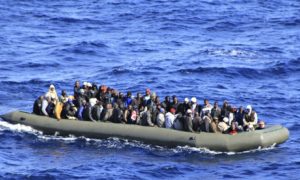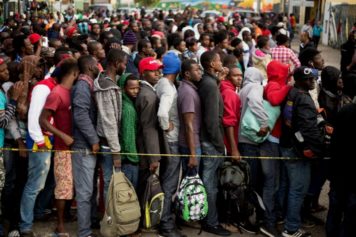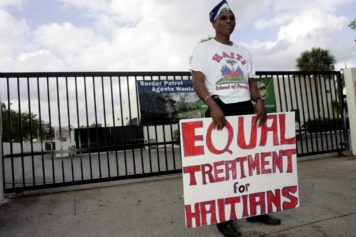
The Italian navy has rescued more than 4,000 migrants in recent days, with calmer seas causing an upsurge in boats trying to reach Italy. Photograph: Reuters
The African migrant crisis is an international catastrophe, as the world has witnessed the recent deaths of Africans attempting to make it to Europe. People are dying by the thousands, yet the world community is not motivated to act to address and alleviate the crisis.
On Thursday, at least 150 people drowned off the coat of western Libya near the port city of Zuwarah, after a fishing boat sank in the Mediterranean Sea. A Libyan Red Crescent official said that 82 bodies had washed ashore, 198 people were rescued, and 100 more still were unaccounted for. This accident is among the worst disasters involving the deaths of migrants and refugees trying to reach Europe from North Africa. This year at least 300,000 people have attempted to make this crossing, with at least 2,500 dying in the process according to the United Nations High Commissioner For refugees. Typically, traffickers pack 300 to 400 people onto fishing boats. In April, another similar Mediterranean boat disaster claimed 400 lives.
Meanwhile, the same day, Hungarian police have arrested four people after the discovery of 71 bodies in a truck, presumed to be Syrian, including 59 men, eight women and four children, as the BBC reported. One child was between one and two years. The people, who likely suffocated, were presumed dead when the vehicle crossed from Hungary into Austria.
After hundreds of years of European countries slicing up, plundering, raping and enslaving Africa, Africans now escape to Europe—seeking a better life from the realities these European nations helped create in Africa in the first place. And once in Europe, these Africans potentially face even worse conditions and more harsh treatment than the situations they left at home.
Whether these Africans are considered refugees or migrants has significant implications. For example, as the New York Times notes, although the terms are often used interchangeably, the two terms differ. A refugee is someone who has fled his or her country as a result of war or persecution, and can prove this. The 1951 refugee Convention defines a refugee as, “A person who owing to a well-founded fear of being persecuted for reasons of race, religion, nationality, membership of a particular social group or political opinion, is outside the country of his nationality and is unable or, owing to such fear, is unwilling to avail himself of the protection of that country; or who, not having a nationality and being outside the country of his former habitual residence as a result of such events, is unable or, owing to such fear, is unwilling to return to it.”
Once designated a refugee, these Africans are entitled to international protections and cannot be sent back home to the source of danger. Otherwise, these people are considered migrants, people who may be seeking better economic opportunities. There is a debate as to whether people fleeing the effects of climate change are in fact, refugees.
“The umbrella term migrant is no longer fit for purpose when it comes to describing the horror unfolding in the Mediterranean,” wrote Barry Malone, the online editor of Al Jazeera English, in a blog post. “It has evolved from its dictionary definitions into a tool that dehumanises and distances, a blunt pejorative.”
Al Jazeera has decided to use the term “refugee” to describe people crossing the Mediterranean.
“Migrant is a word that strips suffering people of voice,” Malone concluded. “Substituting refugee for it is – in the smallest way – an attempt to give some back,” he added.
As the Independent recently reported, anti-immigrant sentiment, xenophobia and intolerance are a part of the discourse in Europe. European newspapers use the terms “siege,” “invasion” and “horde” when describing African refugees, and Europe characterized as a “war zone” as “marauding” foreigners “swarm” the borders.
The scale of the refugee crisis is daunting, with 100,000 people arriving in the EU in July alone. According to the Financial Times, the immigration crisis is creating divisions among the European nations, with Germany, taking in 40 percent of asylum seekers, while Britain is taking 4 percent and France 8 percent. In France, the neo-fascist National Front Party, capitalizing on the anti-immigrant sentiment, is dragging the nation’s politics to the extreme right.
In Israel, officials began releasing nearly 1,200 refugees from the Holot detention facility in the Negev desert, without a place to go according to UPI. They are prohibiting from working in Tel Aviv and Eliat, where many former detainees live. Around 50,000 African migrants live in Israel, typically from Eritrea and Sudan, and they face detention, racism, police brutality and other humiliating conditions. Israeli PM Benjamin Netanyahu, whose rightwing Likud party as benefited from scapegoating of Africans as infiltrators, said that the Africans “threaten the country’s Jewish character.”
Meanwhile, in Spain, the death of a Senegalese man during a police raid in the beach town of Salou led to a peaceful antiracism protest of 200 people. The man had fallen from a third-floor balcony during the raid. Approximately 10 percent of Spain’s population of 46 million are foreigners, and immigrants face a particularly tough time with heavy handed police tactics. Further, the economic recovery has not reached the poor, who revert to the underground economy as unemployment exceeds 22 percent. Human rights groups are demanding that undocumented immigrants receive free health care.
In June, EU leaders decided to relocate 40,000 migrants from Italy and Greece to other EU nations.


